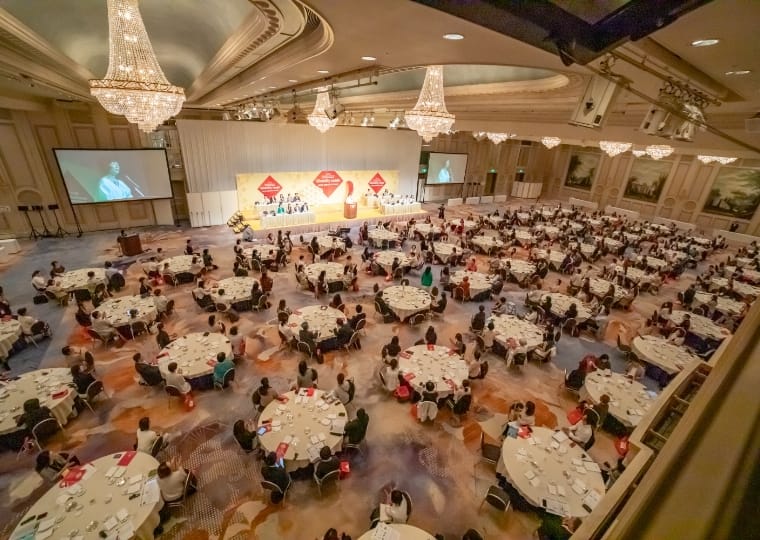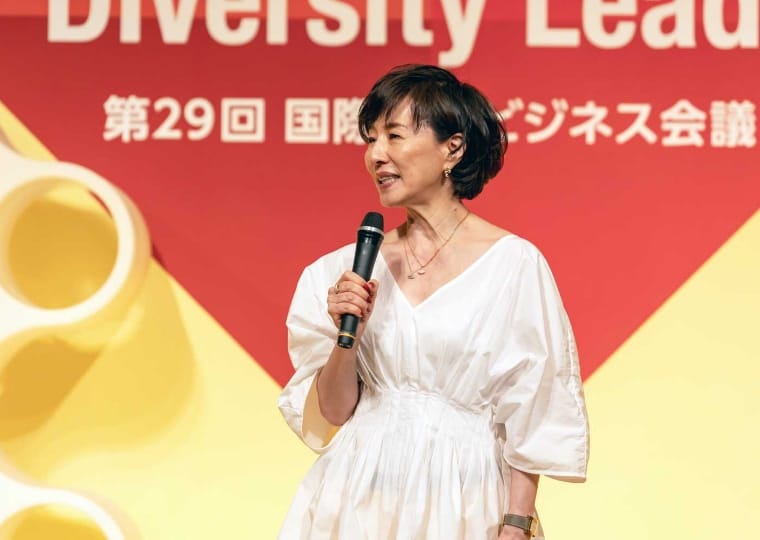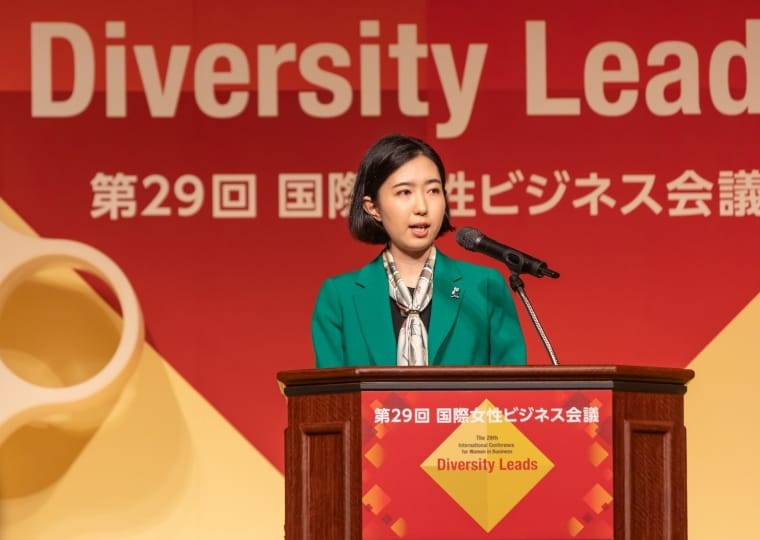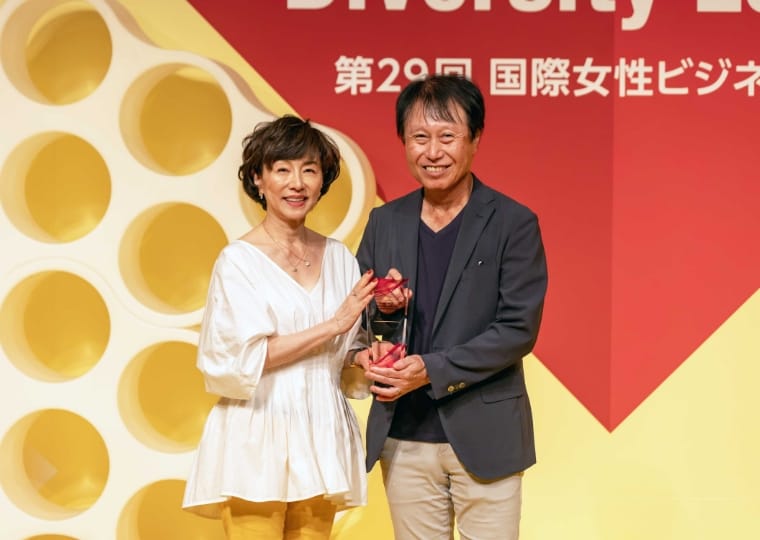Overall Report
Overall Report
Highly motivated people gather from all over Japan to learn about how "Diversity Leads" at the 29th International Conference for Women in Business (ICWB) in Tokyo

At 8 am, a full hour before the doors opened at 9 am for the 10 am ICWB conference, participants were already queuing. This scene, in which participants arrive early to exchange business cards and get to know each other, is unique to the ICWB. After four years of online conferences, the all-day conference was held at the Grand Nikko in Daiba, Tokyo for the first time in five years on Sunday, July 28, 2024.
This year marks the 29th anniversary of the International Conference on Women in Business, a diversity conference that has been held every summer since 1996. The number of male participants was 21%, exceeding 20% for the second year in a row. Embassies of several countries sent their ambassadors and other high-ranking officials. The participants, of which 69% are managers or executives and range in age from teens to those in their 70s, have one thing in common; they are highly ambitious and passionate. As friends from Japan and abroad gathered together, the 29th ICWB commenced with excitement in the air.

Prime Minister Kishida addressed the Conference in a video message in which he committed to moving forward with diversity, saying, "I hope that gathering diverse perspectives will be the first step toward a better future." Then Ms. Kaori Sasaki, the general producer responsible for the planning, casting, and direction of all 29 Conferences, spoke passionately about this year's theme, "Diversity Leads."
"The purpose of diversity is to bring together the power of individuals to achieve greater results. It is meaningless to just have diverse people present. The goal is to work together to create a positive impact. To that end, management and human resources create a supportive system, but the bottom line is the actions of the individuals. Each of us needs to present our individuality in a way that is easy for others to accept so we can collaborate with them and create better outcomes," "Today’s conference is no different; it’s up to you to connect with others and to learn from the wisdom of our speakers. With full hearts and open minds, let’s all commit to making this a wonderful day." The room filled with enthusiastic applause. The first keynote speech was given by a speaker that made a life-changing connection 10 years ago. When Ms. Hinako Kijima participated in the ICWB as a high school student with the support of a Matching Sponsor in 2015, she promised herself, "I will be a speaker at this conference in 10 years!" (In the Matching Sponsor program, young people write an essay in hopes of being selected by a Sponsor who will pay their registration fee.) Currently, she works in international finance at the Bank of Japan. The 27-year-old said that when Kaori Sasaki suggested that she give a keynote speech at the opening, she said, "If they were the role models I admired at that time, I would say yes at a time like this, so I said yes." Fulfilling her vow to herself, she stood proudly on the stage and delivered a powerful message and proposed concrete actions to "accept the baton of courage and use your strength to pass it on to the next generation". Everyone in the hall was moved by her passion.

The second keynote speaker was Ms. Yuka Ota, the first Japanese woman to become a South Africa government-licensed safari guide. She shared a moving video about elephant conservation activities in the savannah and the impact of the extraction of mineral resources, etc., on the wildlife habitat. She spoke about how biodiversity affects the entire planet, not just the savannah, and how Japanese consumers can support them by altering their consumption habits.
Live from Pakistan, Ms. Maheen Adamzie, the CEO of Dot & Line, was the next to speak. Ms. Adamzie provides online programs for Pakistani women who want to go out into the world but are unable to do so. She spoke passionately about empowering women: "When you rely on men for your financial situation, they make all the decisions. But by working, women can also participate in the decisions," she said, referring to the positive changes she is seeing both at home and abroad.
Next up was a talk show by leaders who practice diversity management. Under the theme of "Corporate Growth Brought about by Diversity," Kaori Sasaki, President of Unicul International and of ewoman, Inc., facilitated a discussion with Takayuki Morita, President and Representative Executive Officer of NEC, and Meyumi Yamada, Director of Ice Thailand, known for "@cosme”. Listening to such powerful leaders talk about how they are working to improve diversity in their organizations was inspiring, with nuggets such as these peppering the conversation: “Diversity can be practiced because there is mutual trust", “there is no fear of confrontation," and "diverse team members create more innovative services.” They talked about how a more diverse teams can create high-growth businesses because they bring broader perspectives to the team.
The last program of the morning session was a talk show facilitated by Ms. Asako Aoyama, who oversees FP&A for the NEC Group. Ms. Wakana Tanaka, Head of LinkedIn Japan, Ms. Tamao Sasada, Head of Bank of America in Japan, and Ms. Kristin Iglum, Ambassador of Norway to Japan spoke in English about the nature of global teams and how they manage them. Each of the speakers, all of whom lead a multinational team, shared valuable advice, such as "It is important for leaders to show their weaknesses and ask for support" and "Since English is not the first language for many people, it is more important to convey the message than whether someone speaks fluently." In addition, the Ambassador of Norway to Japan told us about advanced case studies in Norway and stories of her own experiences leading multinational teams in various countries.
The morning program came to an end with a sumptuous hotel course luncheon at which participants enjoy talking with their tablemates and deepen their connections.
The afternoon program began with a special lecture by Ms. Seiko Noda, a member of the House of Representatives who urged the participants with her strong words: "It's often said that there needs to be a generational change, but there's something to be done before that, and that's a gender change. About 50% of Japan’s population is females, but only 10% of our politicians are women. We women need to be conscious and aware of this.”
Next was a live broadcast from Noto by journalist Ms. Keiko Hamada, who spoke passionately about the current situation in Noto due to the 7.6 Richter earthquake that struck on January 1, 2024. "The collapsed houses are not demolished, the roads remain cracked, temporary housing is allocated through a lottery, and those who cannot get in are on their own. It has been forgotten. We need more support, and even if we can't do it right now, people asking us to show them the way forward.” Everyone listened intently, as if willing the government to provide more support.
The next talk show, facilitated smoothly by Ms. Tomoko Nagano, a journalist, featured Ms. Asako Osaki of the NPO Gender Action Platform; Ms. Chiharu Takakura, representative of Takakura & Company; and Ms. Yoshio Kashiwamura, executive officer of Recruit. The theme was “The sin of wage disparity: striving for an organization that makes the most of an individual.” Ms. Osaki explained that there is a gender wage gap between men and women in Japan; men’s wages are indexed at 100, is 49.6 for men at companies that the government recognizes for women's empowerment. Is it okay to leave it as it is?" The panelists talked about not limiting women’s potential based on their attributes and recognizing that "it is natural that bias exists, and it is important to create a system that does not allow it to exist."
In the next session, Mitsuru Chino, Managing Executive Officer of ITOCHU Corporation, and Mr. Chris Capper, a cybersecurity officer at the United Kingdom Embassy in Tokyo covered the theme "Neurodiversity." Mr. Capper, who became aware of his own learning differences at the age of 17, devised ways to utilize his differences to enhance his performance. He spoke about how his need for clear structures and systems actually helped him to become a leader in cutting-edge cybersecurity, where such skills are highly valued. Ms. Chino and Mr. Capper provided cutting-edge examples of how neurodiverse people are in demand in the global IT industry.
In the talk show with the theme of "Utilizing Diversity to Open Your Career," Ms. Rie Hirakawa, a visiting professor at Showa Women's University’ Organization for Diversity Promotion; Ms. Masako Yada, an advisor to the Prime Minister; and Ms. Ai Seike, the mayor of Minato Ward, took the stage. NHK commentator Ms. Keiko Yamamoto facilitated the session. The speakers, who have accumulated a broad range of experiences, spoke passionately, advising the participants to "think about how to build your career over the years" and "The world will definitely change when women are burdened with childcare and nursing care, so please continue to work."
The talk show titled "Opening up New Businesses," facilitated by Kaori Sasaki, was a discussion between the Vice President of Panasonic, Mr. Shigeru Dono, and the Vice President of Astroscale, Ms. Miki Ito, who is engaged in the development of demonstration satellites that will be responsible for the recovery of debris from space. They talked about the false belief that new businesses cannot be created until the mechanisms in long-established systems are changed. Ms. Ito explained that her company sees space as a large ecosystem.
In the Roundtable sessions, the participants chose one of four themes. The panelists discussed the theme for about 30 minutes and then opened the floor to a free-flowing and lively Q&A session. In "What is human capital?~Data on the performance of diversity organizations," the panelists and participants discussed the efforts of leaders who have brought about change in their respective companies, and how the data shows the need for change, and some participants shares cases as well.
In "How generative AI is changing the way we work and do business," participants learned about the current status of the evolution of generative AI and delved into the changes in the way we work, as well as the possibilities and risks posed by AI.
In "How diverse perspectives create a hit product!", leaders shared their ideas about, and experiences of, leveraging unique perspectives to create new value and also their thoughts on the potential of diversity in manufacturing.
In the session held entirely in English, "How to empower woman at work: Success stories" speakers from embassies in Ireland, South Africa and Australia offered their best practices and ideas and experience on how women can advance their careers.

The day culminated in the buffet dinner networking party where the energy and excitement of the day was still high. First, the speakers, the Matching Sponsors, and the students they sponsored took the stage. They were both inspired and inspiring as they shared their new learnings and excitement about the Conference. The Gold Partner companies were introduced and then Norwegian Ambassador Christine Iglum offered a toast to old friends and new. The participants exchanged business cards as they enjoyed the sumptuous buffet dinner with a glass of wine. Everyone in the room was happy to experience the energy of a live Conference again and to greet old friends and make new ones.
In the closing session, Kaori Sasaki announced that the 30th ICWB will be held on July 13, 2025, saying, "I hope to see you again next year. Thank you!"
The audience erupted in applause. The International Conference for Women in Business, came to a close, but the participants left with enough enthusiasm and energy to last until next the next conference!
International Conference for Women in Business









